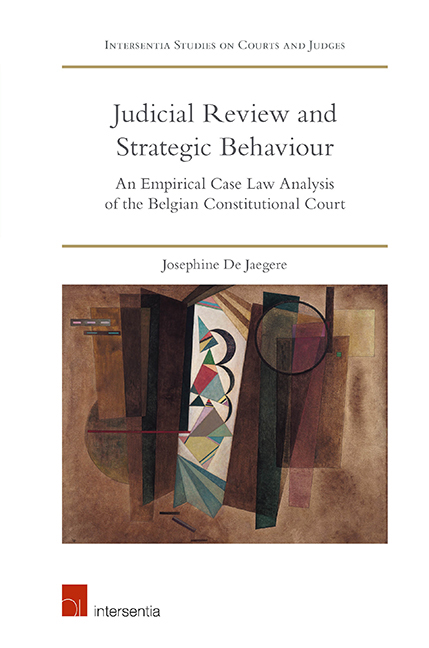 Judicial Review and Strategic Behaviour
Judicial Review and Strategic Behaviour Book contents
- Frontmatter
- Foreword
- Acknowledgements
- Contents
- Introduction
- PART I NORMATIVE FRAMEWORK: THE DELIBERATIVE PERFORMANCE OF CONSTITUTIONAL COURTS
- PART II THE CONTOURS OF JUDICIAL DECISION-MAKING
- Chapter 2 The Institutional Framework of the Belgian Constitutional Court
- Chapter 3 Variation of Judicial Behaviour within the Institutional Boundaries
- PART III EMPIRICAL ANALYSIS OF THE BELGIAN CONSTITUTIONAL COURT'S CASE LAW
- Conclusion
- Codebook
- Bibliography
- Index
- About The Author
Chapter 3 - Variation of Judicial Behaviour within the Institutional Boundaries
from PART II - THE CONTOURS OF JUDICIAL DECISION-MAKING
Published online by Cambridge University Press: 26 June 2019
- Frontmatter
- Foreword
- Acknowledgements
- Contents
- Introduction
- PART I NORMATIVE FRAMEWORK: THE DELIBERATIVE PERFORMANCE OF CONSTITUTIONAL COURTS
- PART II THE CONTOURS OF JUDICIAL DECISION-MAKING
- Chapter 2 The Institutional Framework of the Belgian Constitutional Court
- Chapter 3 Variation of Judicial Behaviour within the Institutional Boundaries
- PART III EMPIRICAL ANALYSIS OF THE BELGIAN CONSTITUTIONAL COURT'S CASE LAW
- Conclusion
- Codebook
- Bibliography
- Index
- About The Author
Summary
INTRODUCTION
In the previous chapter, the institutional contours of the BeCC's judicial behaviour were discussed. A few important conclusions could be drawn. On the one hand, the BeCC has considerable potential to fulfil the deliberative expectations that weigh on it. However, the parliamentary documents also demonstrated that the Court's competences could only be expanded if the BeCC showed itself to be a ‘reliable’ partner. The rationale behind this evolution, in particular that the BeCC is expected to act prudently when a judicial outcome would impact upon political prerogatives, may still weigh on the Court. To fully comprehend the role of the Court within the Belgian democratic polity, it should be elucidated to what extent expectations such as these might still weigh on the Court's decision making process. The Court might attain or frustrate those expectations in different cases, revealing which incentives surround its decision-making process.
Each judicial decision is the transformation of inputs – challenging or supportive of the legislation under review – into outputs. More specifically, it is said that “judges’ decisions are a function of what they prefer to do, tempered by what they think they ought to do, but constrained by what they perceive is feasible to do”. There is a large body of scholarship, especially in the US, aiming to explain the choices justices make. The basic assumption of these scholars is that justices are committed to a vision on public policy, and that the desire to maximise their effectiveness drives their actions.
Through empirically analysing judicial behaviour, of the US Supreme Court in particular, they have amassed evidence indicating that justices actually seek to achieve, and strategically act to secure, this particular goal. The envisioned judicial target is believed to be centred on law or politics, or a combination of both. The traditionally dominant models of judicial behaviour – labelled legal, attitudinal and strategic – each emphasise one aspect of these targets.
This chapter, drawing upon these theories on judicial behaviour, explains why strategic actions may be expected from the BeCC. In particular, it is argued that in salient cases, the formulation of the ruling – the outcome as well as the justificatory ground – is likely to be affected by strategic considerations regarding the anticipated behaviour of other actors involved in the broader policy arena.
- Type
- Chapter
- Information
- Judicial Review and Strategic BehaviourAn Empirical Case Law Analysis of the Belgian Constitutional Court, pp. 103 - 124Publisher: IntersentiaPrint publication year: 2019


